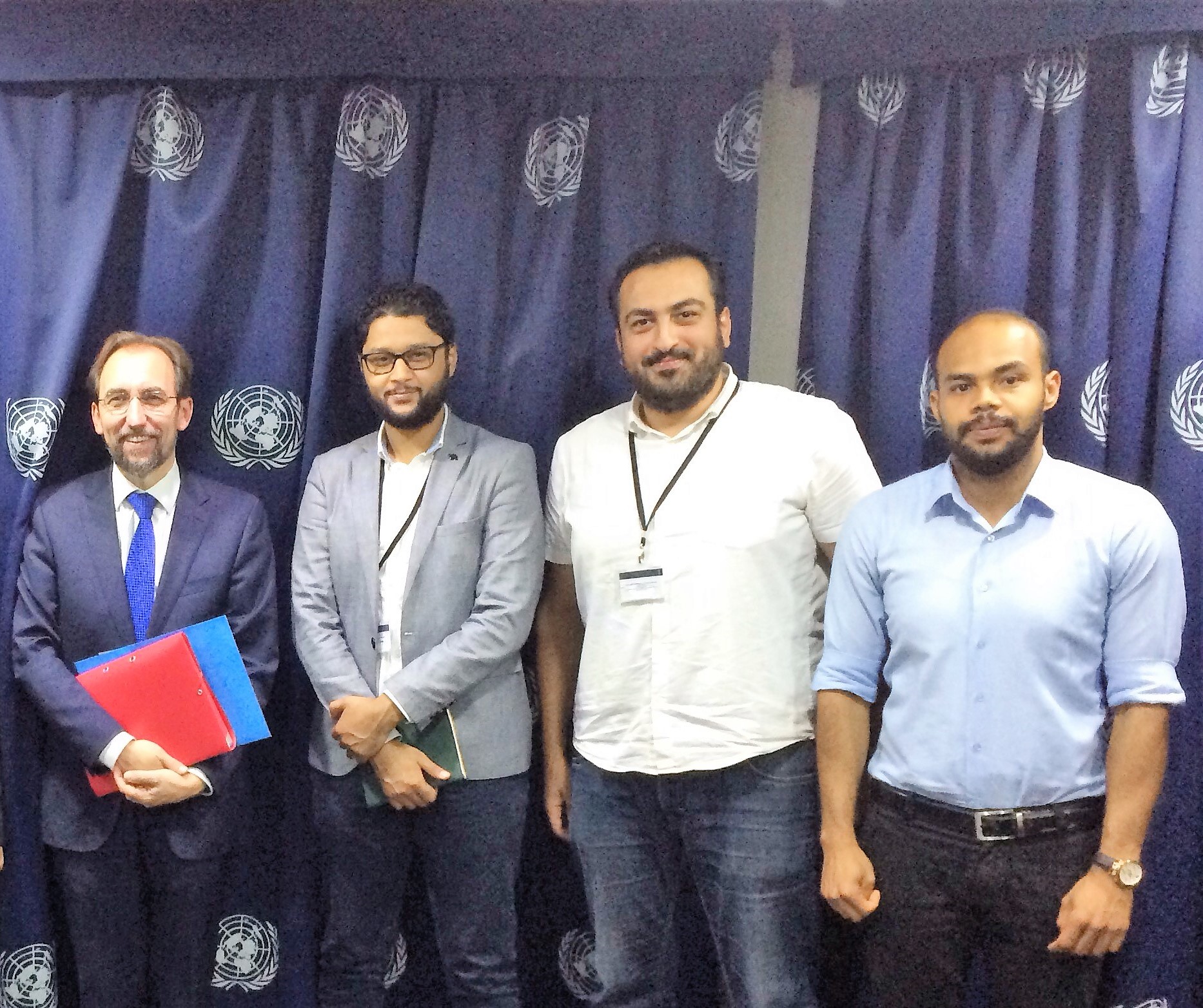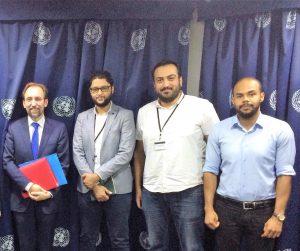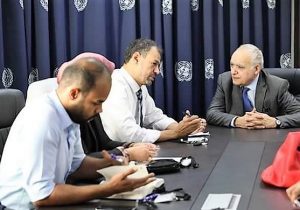In two separate meetings with the UN yesterday October 9th, Libyan civil society representatives emphasized that the ongoing humanitarian catastrophe and the stalled peace and reconciliation process cannot be addressed without an international mechanism ensuring accountability for grave violations. UN Libya envoy Ghassan Salamé and UN High Commissioner for Human Rights Zeid Ra’ad met with the Cairo Institute for Human Rights Studies (CIHRS) and representatives of the Coalition of Libyan Civil Society organizations (The Platform[1]) in Tunis at the office of the UN Support Mission in Libya (UNSMIL), where they discussed potential steps to alleviate the impunity and violence plaguing the country.
Given the absence of an effective national justice system in Libya, international accountability mechanisms are imperative in address rampant impunity in a country where respect for human rights is decimated by escalating attacks on local civil society organizations, human rights defenders, members of the judiciary, media workers, civilians, and migrants. The Platform emphasized that Libyan authorities must formulate a clear strategy to restructure the security establishment and the judicial system, as well as supporting the education and health sectors for vulnerable populations. The freedom of expression and association and the return of internally displaced persons (IDPs) must be prioritized in this strategy.
The Platform representatives also emphasized the frequency of extrajudicial killing, torture, arbitrary detention, and indiscriminate attacks on residential areas and infrastructure, as well as increasingly incendiary hate speech and incitement to violence. Religious rhetoric is deployed by several parties as a pretext to harass activists and human rights defenders throughout the country. Members of the Platform said that these ongoing violations by military and paramilitary groups—committed in the context of their struggle for power—have paralyzed the legislative and executive authorities along with a severe impact on daily life and the provision of public services. Moreover, they undermine national reconciliation and the progress made by local reconciliation sessions in Libya and the UN-backed political dialogue committee.
The Platform believes that the stalled political process and the rising tide of violence in Libya are an expected outcome of persistent impunity for grave human rights breaches and the lack of serious action to restructure the country’s security institutions. There can be no talk of combatting terrorism, peaceful coexistence, and the rule of law without first addressing these two factors.
The last resolution at the HRC issued in March 2017 requested OHCHR reporting on Libya to ensure individual accountability for crimes committed in Libya. A hard-won concession at the time, the resolution was supported by HRDs and human rights organizations to ensure further deterrence and preserve evidence for accountability efforts. Accordingly, the Platform believes it is extremely important that the OHCHR follow up on this resolution by using the reporting process to identify individuals and groups responsible for crimes being committed in Libya, and to ensure that actors in Libya understand that the OHCHR will be gathering such information and submitting it to credible judicial authorities, including the ICC.
The Platform believes that setting international accountability mechanisms in motion will reduce the attacks and insurgency of military and paramilitary groups against nascent state institutions and local and national reconciliation initiatives. The impact of this process inside and outside of Libya will help isolate armed groups internationally and frustrate their ability to undermine Libyan initiatives for a peaceful, lasting solution.
The Platform delegation offered the following recommendations to the UN envoy and the UN High Commissioner:
Recommendations to the OHCHR:
- Continue, with the UN HRC, to monitor violations in Libya.
- Establish mechanisms, in cooperation with Libyan associations, to monitor the Libyan authorities’ implementation of the recommendations of the OHCHR fact-finding committee, formed pursuant to the HRC resolution of March 2016.
- Collect evidence and issue public reports about persistent, grave violations in Libya to clarify the chain of command, especially regarding cases of extrajudicial killing, torture, rape, arbitrary detention, and arbitrary attacks on residential areas and infrastructure, according to the HRC resolution of March 2017. Some of these violations amount to crimes against humanity and war crimes, committed during internecine conflict between military and paramilitary groups competing for power and legitimacy.
- Pressure the authorities in Libya to end systematic obstructions of freedom of expression and association in the east and west, including barriers to the registration of local and international associations, security surveillance, the abduction and arbitrary detention of human rights defenders and members of civil society, and violations of the right of movement, especially against female human rights defenders.
- Support repeated demands from Libyan civil society for a commission of inquiry in Libya, during the HRC session of March 2018.
Recommendations to the UN Libya envoy:
- Pressure the official and de facto Libyan authorities to draft a practical plan, in the form of draft bill, for a comprehensive, transparent national strategy for the restructuring of the national security establishment in the short, medium, and long terms.
- The following (based on clear, precise criteria) should be considered as a condition for lifting the arms embargo on Libya: progress toward the reform of the security sector, the rule of law, and respect for human rights, in accordance with international standards and as monitored by civil society.
- Prioritize breaking the cycle of impunity, restoring the effectiveness of the criminal justice system, and spurring international mechanisms for accountability.
- Pressure the Libyan authorities to guarantee freedom of expression, association, and peaceful assembly; protect civil society activists and organizations, journalists, and media workers from attacks; ensure their safety and guarantee a safe environment for them; and take serious action to combat hate speech and incitement to violence in the media.
- Enable local groups and civil society to effectively influence peace negotiations; the Skhirat Agreement was based on the demands of members of the National Congress, the Parliament, and their allies in paramilitary groups, while devoid of contributions from a popular base on the local and national levels for a vision of sustainable national reconciliation in Libya.
- Pressure the Libyan authorities to take swift action to resettle displaced persons and resolve their security and occupational claims.
- Pressure the Libyan authorities to take swift action to settle the files of missing and displaced persons and comply with the deadlines set forth in the political agreement to improve their conditions.
- Pressure the House of Representatives to reconsider the general amnesty law in regard to war crimes and crimes against humanity – such as murder, torture, and rape.
[1] The Platform was founded in 2016. The vision of the Platform is to create a space for exchange, dialogue and coordination in order to develop and enhance the capacity of the Libyan civil society and enable it to play an effective role in promoting public freedoms and human rights. Furthermore, the Platform envisions the development of a joint strategy for change and impact on the different levels. Further, look to : Libya: Towards Resolving The Humanitarian Crisis And Promotion Of Human Rights.
Share this Post



